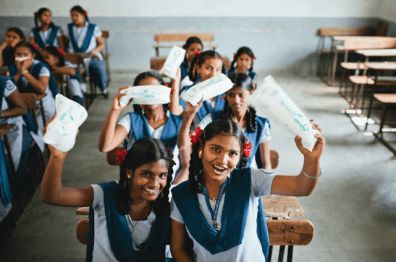
You might be shocked to learn that over 300 million women in India do not use sanitary pads and that 71% of girls in the country report having no knowledge of menstruation before their first period. Worse yet, a study suggests that nearly 1 out of 4 girls in India end up dropping out of school after starting their menstrual period.
It’s in this context that Mumbai-based Aakar Innovations was born. Driven by their mission to provide access to affordable, biodegradable sanitary pads and menstrual health education to women and girls in rural India, Aakar went on to develop India’s first certified 100% compostable sanitary napkin.
Aakar’s approach is simple: Sanitary pads are produced at local productions hubs, which are fully run and operated by women. The production hubs provide job opportunities for women, enabling them to make an income, and also contribute to meaningful social change in their communities. Local women’s groups sell and distribute pads, and provide education and awareness about menstruation, empowering women to manage their menstruation with dignity, and challenging the harmful beliefs that menstruation is dirty and shameful.
With funding from Grand Challenges Canada, Aakar has established 20 production hubs, creating 132 jobs, and providing nearly 55,000 women and adolescent girls with good quality, hygienic sanitary pads.
I recently had the chance to travel to India to visit Aakar’s team and learn more about the barriers to safe and dignified menstrual hygiene management. While I was there I met with some amazing women who are doing something about it, including Sarika who serves as production manager at one of the production hubs.
Sarika gave me a tour of the production hub, and a demo of how the sanitary pads are made. The hub Sarika supervises employs seven women, and produces more than 10,000 sanitary pads per week. Sarika describes it as more than just a job: “I earn my living here and I’m also happy to do my own bit to help other women.” More than just a supervisor, Sarika has learned how to maintain and fix the equipment.
But more importantly, I left feeling inspired by the first-hand accounts of the incredible difference Aakar’s pads and menstrual health education is having on the lives of girls and women in these rural communities:
“The response from the girls has been very positive and they come personally to me and talk about issues that they are suffering from and [seek] guidance for the same. I tell the mothers too, to take care of their daughters’ menstrual needs.” – Vaishali Mahendra Gaikwad, Master Trainer, Behaviour Change Curriculum, Indapur and Baramati
“[Before] I did not go to the temple and also kept fast during menstruation. But God has not punished me in any way for going to temple and eating [during menstruation]. Rather I feel more peace as my routine of praying doesn’t get affected due to menstruation.” – Meera Sharma, a woman who participated in training in Bhor, India
Sources
[1] FSG. “Menstrual Health in India – Country Landscape Analysis.” 2016.
[2] USAID et al. “Spot On! Improving Menstrual Health and Hygiene in India.” 2017.
[3] USAID et al. “Spot On! Improving Menstrual Health and Hygiene in India.” 2017.
[4] van Eijk AM,. Sivakami M, Thakkar MB, et al. “Hygiene management among adolescent girls in India: a systematic review and meta-analysis.” 2016.
[5] van Eijk AM,. Sivakami M, Thakkar MB, et al. “Hygiene management among adolescent girls in India: a systematic review and meta-analysis.” 2016.
[6] The Times of India. “70% can’t afford sanitary napkins, reveals study.” 2011.
Grand Challenges Canada is dedicated to supporting Bold Ideas with Big Impact®. Funded by the Government of Canada and other partners, Grand Challenges Canada funds innovators in low- and middle-income countries and Canada.
Publié:
mars 15, 2019
Auteur:
Grand Challenges Canada
Catégories:
Partager cette publication: